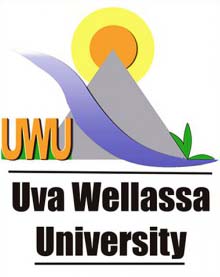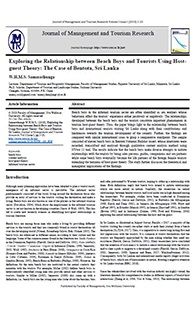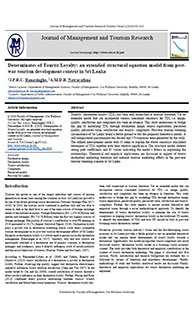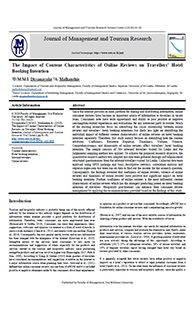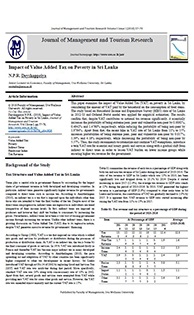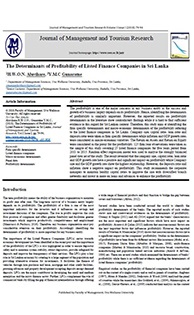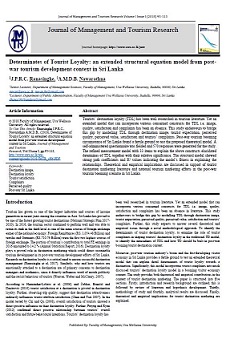Volume 01 Issue 01
TABLE OF CONTENTS
RESEARCH ARTICLES
01.Understanding the Relationship between Beach Boys and Tourists in Sri Lanka
W.H.M.S. Samarathunga
INFORMATION
Journal Title: Journal of Management and Tourism Research
Volume : 1
Issue : 1
Page : 1 – 20
Submitted: June 05, 2018; Revised: August 01, 2018; Accepted: August 17, 2018
Correspondence : manoj.susl@gmail.com
ABSTRACT
Beach boys in the informal tourism sector are often identified as sex workers whose behaviour affect the tourists’ experience either positively or negatively. The relationships developed between the beach boys and the tourists constitute important phenomenon in tourism host-guest theory. Thus, the paper brings light to the relationship between beach boys and international tourists visiting Sri Lanka along with their contributions and hindrances towards the tourism development of the country. Further, the findings are compared with similar international cases to grasp a comparative standpoint. The sample consisted of eleven beach boys in Bentota National Holiday resort, whose interviews were recorded, transcribed and analysed through qualitative content analysis method using NVivo 11 tool. The results indicate that the beach boys make diverse attempts to initiate relationships with the tourists by being sales persons, guides, companions and sex partners while some beach boys eventually become the life partners of the foreign female tourists extending the horizons of host-guest theory. The study further discusses the theoretical and managerial implications of the findings.
02. Assessing the Antecedents and Consequences of Work Life Imbalance (With Special Reference to Female Nurses in Government Hospitals)
1K. Biyagamage, 2J. Sutha
INFORMATION
Journal Title: Journal of Management and Tourism Research
Volume : 1
Issue : 1
Page : 21 – 40
Submitted: June 15, 2018; Revised: June 24, 2018 ; Accepted: August 17, 2018
Correspondence : kokihan92@gmail.com
ABSTRACT
Work life imbalance has been identified as one of the serious problems among nurses in health care industry of Sri Lanka. The overall research study has been structured based on the concept indicator model built up with referring to the two research objectives, which was identifying the antecedents and consequences of work life imbalance. The qualitative research was conducted through structured interviews, using 20 female nurses who are employed at Colombo District Government Hospitals. Qualitative data were analysed by using the thematic analysis. The findings of the study revealed that, parental demand, lack of family support, task difficulty, nature of working schedules and lack of staff as the antecedents which create the work life imbalance and intention to leave the job, conflicts in work and home, health problems, feeling overload and stress and demanding leaves as consequences of work life imbalance. Consequently, the current study concluded that among the majority of selected participants, the work life imbalance is existing. Based on the in-depth data collected by participants, it identified that they are having struggles in balancing their work lives while balancing their personal lives. Finally, study suggests management of hospitals to pay more attention on reducing nurses’ work life imbalance by taking necessary steps and actions. Equally, this study will be beneficial in employees’ perspective to enhance their work life and personal life by getting a proper understanding of work life imbalance.
03. The Impact of Content Characteristics of Online Reviews on Travellers’ Hotel Booking Intention
1D.M.M.I. Dissanayake, 2A.Malkanthie
INFORMATION
Journal Title: Journal of Management and Tourism Research
Volume : 1
Issue : 1
Page : 41 – 56
Submitted: June 15, 2018; Revised: August 04, 2018 ; Accepted: August 17, 2018
Correspondence : maheshikarusl@gmail.com
ABSTRACT
Since the internet provides an ideal platform for sharing and distributing information, online consumer reviews have become an important source of information to travellers in recent years. Consumers now have wide opportunity and ability to post positive or negative consumption-related experiences and evaluations for any interested party to review. Much of the existing researches focus on identifying the causal relationship between online reviews and travellers’ hotel booking intentions but sheds less light on identifying the individual impact of different content characteristics of online reviews on hotel booking intention separately. Therefore, this study mainly focuses on identifying how the content attributes: Usefulness, Reviewer Expertise, Timeliness, Volume, Valence, Comprehensiveness and Anonymity of online reviews affect travellers’ hotel booking intention. The sample consists of 384 inbound travellers visited Sri Lanka and the judgmental sampling method was applied. To achieve the proposed research objective, the quantitative research method was adopted and data were gathered through self-administered structured questionnaires from the inbound travellers visited Sri Lanka. Collected data were analysed using SPSS package and basic descriptive statistics, correlation analysis and stepwise regression test were run on data to find out the answer for the research question. Consequently, the findings revealed that usefulness of online reviews, valence of online reviews and timeliness of online reviews have positive and significant impact on hotel booking intention. Further, usefulness of online reviews is the most influential content characteristic of online reviews which has the strongest predicting power on hotel booking intention of travellers. Hospitality practitioners can enhance their consumer review management by applying the recommendations provided based on the findings of this study.
04. Impact of Value Added Tax on Poverty in Sri Lanka
N.P.R. Deshappriya
INFORMATION
Journal Title: Journal of Management and Tourism Research
Volume : 1
Issue : 1
Page : 57 – 78
Submitted: June 17, 2018; Revised: July 17, 2018 ; Accepted: August 17, 2018
Correspondence : ravipdn@yahoo.com
ABSTRACT
This paper examines the impact of Value Added Tax (VAT) on poverty in Sri Lanka, by considering the amount of VAT paid by the household on the consumption of food items. The study based on Household Income and Expenditure Survey (HIES) data of Sri Lanka in 2012/13 and Ordered Probit model was applied for empirical estimation. The results confirm that, despite VAT contributes to national tax revenue significantly, it essentially increases the probability of being extreme poor, poor and vulnerable non-poor by 0.0061%, 0.4942% and 1.4760% respectively, while reducing the probability of being non-poor by 1.9764%. Apart from that, the recent hike in VAT rate of Sri Lanka from 11% to 15% increases probabilities of being extreme poor, poor and vulnerable non-poor by 0.017%, 1.39% and 4.16% respectively, while decreasing the probability of being non-poor by 5.57%. Thus, the study recommends to rationalize and continue VAT exemptions, introduce a twin VAT rate for essential and luxury goods and services along with a gradual shift from indirect to direct taxes in order to lessen VAT burden on lower income groups while ensuring higher tax revenue for the government.
05. The Determinants of Profitability of Listed Finance Companies in Sri Lanka
1H.W.O.N. Aluvihare, 2Y.M.C Gunaratne
INFORMATION
Journal Title: Journal of Management and Tourism Research
Volume : 1
Issue : 1
Page : 79 – 94
Submitted: June 15, 2018; Revised: August 02, 2018 ; Accepted: August 17, 2018
Correspondence : omangaaluvihare@gmail.com
ABSTRACT
The profitability is one of the major concerns in any business entity as the success and growth of a business largely depends on its profitability. Hence, identifying the determinants of profitability is similarly important. However, the reported results on profitability determinants in the literature show contradictory findings while it is hard to find sufficient evidence in this regard for Sri Lankan context. Therefore, this study aims at identifying the firm specific determinants and macro-economic determinants of the profitability referring to the listed finance companies in Sri Lanka. Company size, capital ratio, loan ratio and deposits ratio were taken as firm specific determinants while inflation and GDP growth rates were considered as macro-economic variables. The Return on Assets and Return on Equity were considered as the proxy for the profitability. 125 firm year observations were taken as the sample of this study covering 25 listed finance companies for five years period from 2011 to 2015. Random effect regression model was used to analyse the strongly balanced panel data set of the study. The result revealed that the company size, capital ratio, loan ratio and GDP growth rate have a positive and significant impact on profitability while Company size and the GDP growth rate show the highest relationship. However, the deposits ratio and inflation show a negative impact on profitability. This study recommends the corporate managers to maintain healthy capital ratios to improve the size with diversified branch networks and invest in more on loans and advances to enhance the profitability.
06. Determinates of Tourist Loyalty: an extended structural equation model from post-war tourism development context in Sri Lanka
J.P.R.C. Ranasinghe , A.M.D.M. Nawarathna
INFORMATION
Journal Title: Journal of Management and Tourism Research
Volume : 1
Issue : 1
Page : 95 – 113
Submitted: June 15 ,2018; Revised: July 31, 2018 ; Accepted: August 17, 2018
Correspondence : dhana1991bandara@gmail.com
ABSTRACT
Tourists’ destination loyalty (TDL) has been well researched in tourism literature. Yet an extended model that can incorporate various concerned constructs for TDL i.e. image, quality, satisfaction and complaints has been an absence. This study endeavours to bridge this gap by modelling TDL through destination image, tourist expectation, perceived quality, perceived value, satisfaction and tourists’ complaints. Post-war tourism booming circumstance of Sri Lanka found a fertile ground to test the proposed theoretical model. A self-administered questionnaire was fielded and 570 responses were generated for the study. The refined measurement model with 33 items to explain the above constructs elucidated determines of TDL together with their relative significance. The structural model showed strong path coefficients and R2 values indicating the model’s fitness in explaining the relationships. Theoretical and empirical implications are discussed in support of tourist destination marketing literature and national tourism marketing efforts in the post-war tourism booming scenario in Sri Lanka.

